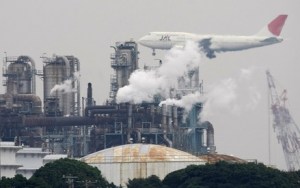The European Commission has suggested suspending the enforcement processes attaching to aviation with the European Emissions Trading Scheme (ETS) for the period of a year. The proposal is part of a strategy to persuade non-EU states to formulate some alternative programme which can apply globally to combat emissions of greenhouse gases from the aviation sector.
Currently, the ETS demands that airlines flying into or out of the EU purchase, as necessary, emission allowances. However, a number of countries beginning with China but also including the USA, Russia and India have threatened simply to ignore the scheme and refuse to engage in purchasing of or trading in allowances. Since aircraft from China and the other countries continue to fly into the EU, it is not at all clear quite how the Commission planned to take action against airlines from these states.
Meanwhile, the scheme will continue to apply to EU airlines for flights within the EU, and the Commission’s proposal will have to be endorsed by the European Parliament.
Since objections to the scheme, other than in terms of its cost, have concerned the compliance of the EU scheme with the Chicago Convention, which amongst other things exempts aviation fuel from national taxation, the obvious forum for international agreement is via the International Civil Aviation Organization (ICAO). This UN Agency was established by the Chicago Convention, which has so far made little progress on curbing aviation emissions.
Whether any real progress will be made in a year must be open to doubt. In spite of Obama’s promise, post election, of greater action on climate change, this coincided with International Energy Agency projections of the USA as the World’s largest oil producer by 2020. US agreement on what has been regarded as de facto tax on aviation fuel in this context may seem fairly unlikely.
The EU climate action commissioner, Connie Hedegaard, is insistent, however, that the year interval represents a last chance to avoid unilateral action by the EU saying “If this exercise does not deliver – and I hope it does – then needless to say we are back to where we are today with the EU ETS: automatically.”
Robert G Lee
AVIATION EMISSIONS FREEZE
The European Commission has suggested suspending the enforcement processes attaching to aviation with the European Emissions Trading Scheme (ETS) the period of a year. The proposal is part of a strategy to persuade non-EU states to formulate some alternative programme which can apply globally to combat emissions of greenhouse gases from the aviation sector.
Currently, the ETS demands that airlines flying into or out of the EU purchase, as necessary, emission allowances. However, a number of countries beginning with China but also including the USA, Russia and India have threatened simply to ignore the scheme and refuse to engage in purchasing of or trading in allowances. Since aircraft from China and the other countries continue to fly into the EU, it is not at all clear quite how the Commission planned to take action against airlines from these states.
Meanwhile, the scheme will continue to apply to EU airlines for flights within the EU, and the Commission’s proposal will have to be endorsed by the European Parliament.
Since objections to the scheme, other than in terms of its cost, have concerned the compliance of the EU scheme with the Chicago Convention, which amongst other things exempts aviation fuel from national taxation, the obvious forum for international agreement is via the International Civil Aviation Organization (ICAO). This UN Agency was established by the Chicago Convention, which has so far made little progress on curbing aviation emissions.
Whether any real progress will be made in a year must be open to doubt. In spite of Obama’s promise, post election, of greater action on climate change, this coincided with International Energy Agency projections of the USA as the World’s largest oil producer by 2020. US agreement on what has been regarded as de facto tax on aviation fuel in this context may seem fairly unlikely.
The EU climate action commissioner, Connie Hedegaard, is insistent, however, that the year interval represents a last chance to avoid unilateral action by the EU saying “If this exercise does not deliver – and I hope it does – then needless to say we are back to where we are today with the EU ETS: automatically.”
Robert G Lee








